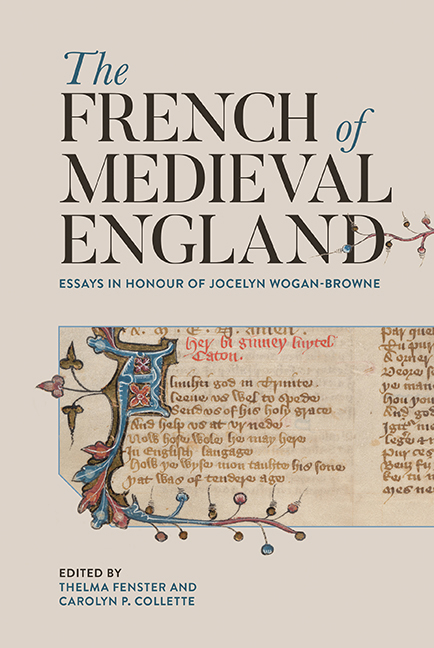Book contents
- Frontmatter
- Contents
- List of Illustrations
- List of Contributors
- List of Abbreviations
- Foreword: ‘The Light I Never Left Behind’: Jocelyn Wogan-Browne
- Introduction: Recognizing the French of Medieval England
- 1 The Gloss to Philippe de Thaon's Comput and the French of England's Beginnings
- 2 The Scandals of Medieval Translation: Thinking Difference in Francophone Texts and Manuscripts
- 3 Contrafacture and Translation: The Prisoner's Lament
- 4 Complaining about the King in French in Thomas Wright's Political Songs of England
- 5 The Chanson d’Aspremont in Bodmer 11 and Plantagenet Propaganda
- 6 The Use of Anglo-Norman in Day-to-Day Communication during the Anglo-Scottish Wars (1295–1314)
- 7 Middle English Borrowing from French: Nouns and Verbs of Interpersonal Cognition in the Early South English Legendary
- 8 William Langland Reads Robert Grosseteste
- 9 Disability Networks in the Campsey Manuscript
- 10 English Women and Their French Books: Teaching about the Jews in Medieval England
- 11 French Residents in England at the Start of the Hundred Years War: Learning English, Speaking English and Becoming English in 1346
- 12 French Immigrants and the French Language in Late-Medieval England
- 13 Fashioning a Useable Linguistic Past: The French of Medieval England and the Invention of a National Vernacular in Early Modern France
- 14 Admiring Ambivalence: on Paul Meyer's Anglo-Norman Scholarship
- 15 Twenty-First Century Gower: The Theology of Marriage in John Gower's Traitié and the Turn toward French
- 16 Royaumes sans frontières: The Place of England in the Long Twelfth Century
- Afterword
- Bibliography
- Index
- Publications of Jocelyn Wogan-Browne
- Tabula Gratulatoria
15 - Twenty-First Century Gower: The Theology of Marriage in John Gower's Traitié and the Turn toward French
Published online by Cambridge University Press: 12 August 2020
- Frontmatter
- Contents
- List of Illustrations
- List of Contributors
- List of Abbreviations
- Foreword: ‘The Light I Never Left Behind’: Jocelyn Wogan-Browne
- Introduction: Recognizing the French of Medieval England
- 1 The Gloss to Philippe de Thaon's Comput and the French of England's Beginnings
- 2 The Scandals of Medieval Translation: Thinking Difference in Francophone Texts and Manuscripts
- 3 Contrafacture and Translation: The Prisoner's Lament
- 4 Complaining about the King in French in Thomas Wright's Political Songs of England
- 5 The Chanson d’Aspremont in Bodmer 11 and Plantagenet Propaganda
- 6 The Use of Anglo-Norman in Day-to-Day Communication during the Anglo-Scottish Wars (1295–1314)
- 7 Middle English Borrowing from French: Nouns and Verbs of Interpersonal Cognition in the Early South English Legendary
- 8 William Langland Reads Robert Grosseteste
- 9 Disability Networks in the Campsey Manuscript
- 10 English Women and Their French Books: Teaching about the Jews in Medieval England
- 11 French Residents in England at the Start of the Hundred Years War: Learning English, Speaking English and Becoming English in 1346
- 12 French Immigrants and the French Language in Late-Medieval England
- 13 Fashioning a Useable Linguistic Past: The French of Medieval England and the Invention of a National Vernacular in Early Modern France
- 14 Admiring Ambivalence: on Paul Meyer's Anglo-Norman Scholarship
- 15 Twenty-First Century Gower: The Theology of Marriage in John Gower's Traitié and the Turn toward French
- 16 Royaumes sans frontières: The Place of England in the Long Twelfth Century
- Afterword
- Bibliography
- Index
- Publications of Jocelyn Wogan-Browne
- Tabula Gratulatoria
Summary
Approximately a third of the English poet John Gower's (d.1408) nearly 90,000 lines of verse is in French. During the past century, while most critical attention has been trained on his Middle English poems, the Confessio Amantis and, to a lesser extent, ‘To King Henry IV In Praise of Peace’, Gower's substantial French oeuvre had generated scant interest, on either side of the Channel and the Atlantic. For French medievalists, Gower's work – late, by their standards, and in a dialect neither precisely Anglo-Norman nor Central French – was beyond the pale of concern. There are certain slight exceptions: Daniel Poirion, Le poète et le prince: l’évolution du lyrisme courtois de Guillaume de Machaut à Charles d’Orléans is one, although Gower's presence there is a mere mention. Similar Continental disregard characterizes the significant studies of Michel Zink: in his Littérature française du Moyen Âge or the more recent Nature et poésie au Moyen Âge, Gower appears but once. Despite the pioneering scholarship of John H. Fisher in his ground-breaking John Gower: Moral Philosopher and Friend of Chaucer, where all of Gower's French works receive attention, for British and American scholars, the majority of whose linguistic skills were insufficient to approach and appreciate Gower's significant sophistication as an other-than-English poet, the body of his French verse was thought (apparently) inaccessible, even daunting, and better avoided. Extremely helpful work on the Anglo-French court culture during these years (e.g., James I. Wimsatt's Chaucer and the French Love Poets, Chaucer and His French Contemporaries; R. Barton Palmer's Chaucer's French Contemporaries; and Lynn Staley's Languages of Power in the Age of Richard II), while valuable for Gower studies, nevertheless was principally focused on Chaucer. By 2015, however, Gower's French poetry has stepped forward, nearer the center of the stage. The important survey volume by Jacqueline Cerquiligni-Toulet, L’écriture testamentaire à la fin du Moyen Âge: Identité, dispersion, trace, makes a sincere attempt to address Gower's French verse, and potentially signalled a tidal shift on the French side of the Channel.
- Type
- Chapter
- Information
- The French of Medieval EnglandEssays in Honour of Jocelyn Wogan-Browne, pp. 257 - 271Publisher: Boydell & BrewerPrint publication year: 2017



